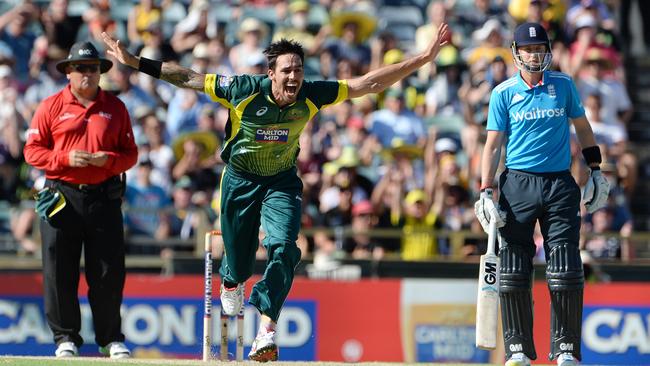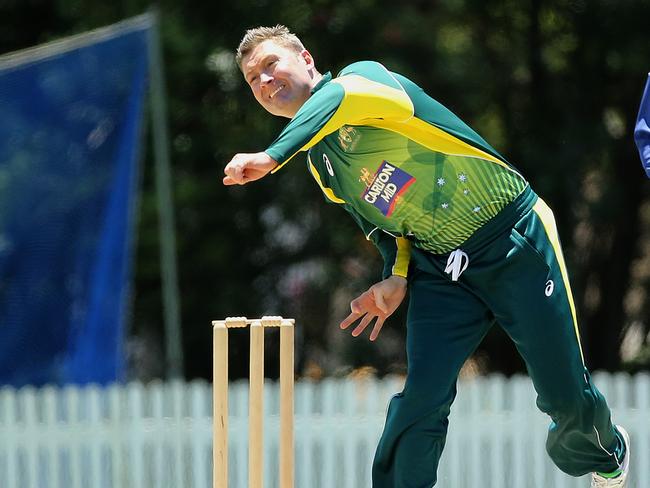Cricket World Cup: Australia should forget about rotating players during tournament
AUSTRALIA once took Mitchell Johnson to a World Cup and he didn’t even have to lace up his boots. Why? Because they didn’t need him.

Cricket World Cup
Don't miss out on the headlines from Cricket World Cup. Followed categories will be added to My News.
STRANGE but true. Australia once took Mitchell Johnson to a World Cup and he didn’t even have to lace up his boots.
Johnson was snubbed in the selection room for 11 games in a row during his first World Cup in the West Indies in 2007.
Why?
Because Australia didn’t need him and had no interest in playing musical fast bowlers just to make fringe dwellers feel good.
AUSSIES WARM UP BY THUMPING INDIA
TEAM SELECTOR: PICK YOUR AUSSIE WORLD CUP XI
That’s how you win World Cups.
Being hard edged. Decisive. Settled.
Leaving the deck shuffling to casino dealers.
We’ve had four years of that since the last World Cup.
From Saturday onwards it must be kitchen sink-throwing time for Australia.
Slam dunk central.
The time to bond, search, destroy and intimidate and to slam whatever you have got on the table.

Put your best 11 soldiers on the park in game one against England on Saturday, then in game two, then in game three.
If that means others are short of match play so be it.
The last time Australia won the World Cup in the West Indies they stormed through undefeated and were so dominant that the tail did not bat in the entire tournament.
If the World Cup is played for 100 years you won’t find a better team performance.
Johnson never played a game because Australia had three quicks ahead of him — Glenn McGrath, Shaun Tait and Nathan Bracken — who played every match bar one and were dubbed the most harmonic trio since the Bee Gees.
Rotation is the theme of Australia’s 50-over strategy between World Cups but from this Saturday it should become a dirty word.
Far from needing to rest players Australia is in the unusual position of trying to keep them match hard.
For the first fortnight of the tournament Australia plays just one game a week.
The top players will be desperately craving time in the middle and it’s important they get it.
There are other lessons from the past for Australia including:
THE CHILL OUT FACTOR
This is one of Darren Lehmann’s key strengths and one he will need to deftly put into action this tournament.
With so much time off between matches players need to be able to wind down.
Lehmann can do this by trying to make things as social as they were during Australia’s 2003 World Cup in South Africa where the team had a boisterous party after every win (even after downing the Netherlands).
Or he can let them return home for a couple of days between matches, an option he was considering last week.
Certainly during the early games it might not be a bad thought.
THE AURA
Australia won three World Cups in a row — two of them undefeated — because they had an aura that made teams tremble.
Australia became known as the team that could win games from anywhere and don’t you forget it.
It means more than hitting teams hard at full strength. It means munching the minnows as well.
That’s all part of it.
When Australia plays Scotland or Afghanistan they should go as hard as when they play England.
You never know who is watching.
Johnson’s aura stretches into several rival dressing rooms already. It needs to be reinforced at every opportunity.
THE SPIN OPTION
Australia downplayed the impact of spin this tournament and it could be to their peril.
They must win three heavy-duty finals in succession to take the title and its hard to imagine in at least one of them they won’t need a decent slow bowler.
If Xavier Doherty cannot do the trick then Finch, Maxwell, Clarke or whoever need to be bowling respectable slow stuff by the finals.

HOLD YOUR NERVE
Few World Cup campaigns go flawlessly. In such a long campaign there is always hiccups.
There’s just one name and one number Australia need to recall when they have a wobble “Pakistan, 1992.’’
Pakistan won the tournament in 1992 despite losing four of their first five games, fielding at times like Edward Scissorhands, conceding countless sundries and having no fifth bowler.
That serves to both inspire Australia and place them on guard that miracles can happen in cricket — and you just don’t want them happening in the rival dressing room.
Originally published as Cricket World Cup: Australia should forget about rotating players during tournament


